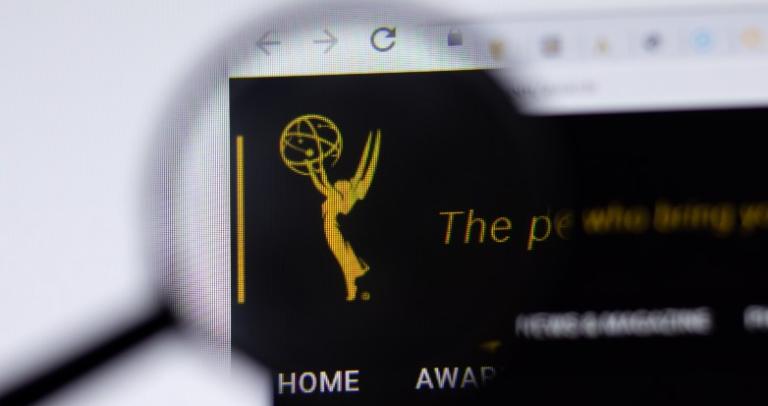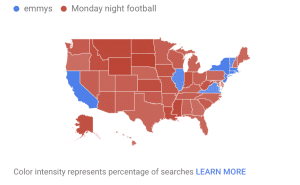
On Monday, Sept. 12, the Primetime Emmys went up against Monday Night Football and pro wrestling — and it was no contest.
Who Won in the Ratings?
The grudge match between new Denver Broncos quarterback Russell Wilson and his former team, the Seattle Seahawks — led by his former backup, journeyman QB Geno Smith — did a number on the ratings for WWE Raw on USA Network, pro wrestling’s flagship show.
From CageSideSeats.com:
Monday Night Football returned last night (Sept. 12) [with] a surprisingly tight game between the Seattle Seahawks & Denver Broncos. It aired on ABC, ESPN & ESPN2, and was watched by 19.8 million with a 5.59 cumulative rating among 18-49-year-olds.
Everyone knew the NFL would take a big chunk out of Raw’s numbers. And it did. WWE’s Mon., Sept. 12 episode was watched by an average of 1.71 million over its three hours.
While the other big Monday event, the Primetime Emmy Awards, scored more viewers than pro wrestling, the night was nothing to write home about.
From IndieWire.com:
Monday’s 2022 Emmys, hosted by “Saturday Night Live” star Kenan Thompson, drew a 1.09 rating (call it a 1.1) in the adults 18-49 demographic and 5.9 million total viewers on NBC, according to Nielsen averages. Those are new record lows for the annual best-of-TV special. …
On broadcast television alone, last night’s show nose-dove 42 percent from the previous year’s key-demo ratings. Its overall viewership declined 25 percent from 2021.
Meanwhile, on Monday Night Football (as I Indulge My Fan/Sportswriter Side for One Segment of This Story)
Personally, I joined my fellow Seahawks fans to stomp and scream at the Backstage, our local bar in Culver City, California. We had a wild time watching Smith and the Seahawks send Wilson and his Broncos back to Denver in defeat, in a thriller of a game that literally came down to a missed field-goal attempt in the final seconds.
Yeah, the Seahawks only won by one point. But true fans expect nothing else from our team, which has the habit of performing half the time like the shambling 1921 Oldsmobile Model 46 truck from The Beverly Hillbillies — with septuagenarian coach Pete Carroll strapped on the back in a rocking chair — and the other half of the time, like a sleek Lamborghini.
In any given game, the team might be one, the other or both.
But the 12s are in for the ups and downs. BTW, 12s is short for the 12th Man on the Field, in honor of the legendary and disruptive amount of noise they cause in stadiums — and they brought it on Monday in spades (and, according to a meter shown on camera, almost hit an ear-shattering 100 decibels).
It even surprised one of our players.
Seahawks defensive end Shelby Harris has played in the league for 9 years.
He said the atmosphere tonight at Lumen was the best and loudest he's ever experienced.@KING5Sports | #Seahawks pic.twitter.com/O4AG4N8Mo1
— Jake García (@Jake_M_Garcia) September 13, 2022
OK, Two Segments of This Story
The game was a nail-biter throughout, with the Seahawks holding the Broncos scoreless at the brink of the end zone more than once.
From ESPN.com:
Denver ran eight plays inside the Seattle 12 in the third quarter and came away with zero points after the two fumbles.
The Broncos had three more plays inside the Seattle 10 midway through the fourth quarter and still couldn’t find the end zone.
Then, with the Broncos needing only a few yards for a first down and a continued drive to the end zone … well, this happened:
With the Broncos facing fourth-and-5 in Seahawks territory with a minute remaining and all their timeouts, coach Nathaniel Hackett opted to let the clock run down to 20 seconds before sending out Brandon McManus to try the low-percentage kick.
All this is to say that it was one humdinger of a game. Nobody stumbled out of our bar into the warm Southern California evening without having lost a chunk of their voice and found a swelling pride in their hearts.
That was some dang good football, and some dang good TV.
Meanwhile, Back at the Emmys
And, then, there was the Emmys. Television’s big night was reportedly a pretty dismal affair, and it’s likely few besides the winners went home feeling better than when they got up that morning. I chose wisely.
Honestly, I forgot about the Emmys until Sunday (mind you, I used to cover TV for a living), and I forgot to record them (OK, I never planned to, anyway). Apparently, the usual suspects congratulated themselves, but a lot of today’s most popular TV shows went home like Russell Wilson — empty-handed.
So, What’s Gone Wrong With the Emmys?
The Broncos may have come up losers on Monday, but hey, at least they got to play. Lots of shows never took the field at the Emmys.
From The Hollywood Reporter:
The winners, meanwhile, did not include some of TV’s most popular shows, such as Paramount Network’s Yellowstone and NBC’s This Is Us, because they weren’t even nominated, although they were certainly featured in montages about how great television is these days. …
Perhaps most disconcertingly, Monday night’s results reinforced my belief that most of today’s TV Academy members, despite living in the era of Peak TV, can’t be bothered to watch, en masse, more than a handful of buzzy shows, bearing out a joke that Thompson made in his monologue at the top of the telecast, which echoed something that I have written about often: “Tonight, we celebrate the hundreds and hundreds of shows that were produced last year — and then we give awards to five of them.”
Indeed, precisely five shows ended up winning multiple awards — HBO’s The White Lotus (five), Apple’s Ted Lasso (four), HBO’s Succession (three), ABC’s Abbott Elementary (two) and Netflix’s Squid Game (two) — while nine others won one apiece.
Monday Night Football vs. The Emmys: The Maps Don’t Lie
The most devastating blow to the Emmys came out today, in an eye-opening post at veteran Hollywood journalist Richard Rushfield’s Substack blog, The Ankler.
Using a series of infographic-style maps reflecting the results of Google searches, Rushfield demonstrates that Hollywood is in danger of speaking only to itself and a select group of devotees, while the rest of America … watches Monday Night Football.
Here’s one image from the blog (please go there and see the rest).

Say what you like about the slap heard round the world at the Oscars, at least it got people paying attention.
According to Rushfield, just watching a bunch of well-paid entertainers in borrowed haute couture vying for statuettes doesn’t seem to cut it anymore.
He writes:
The problem seems to be that the culture at large has all but dropped the aspirational model that was the key to stardom and glamour for circa the last 100 years or so — creating stars and remote, bigger-than-life figures to be idolized at their feet, and their triumphs and indulgences celebrated as victories for all their fans.
You Not Going to Watch If You Don’t Care
I once had FX head John Landgraf tell me that the problem with making TV shows and movies about sports is that it’s extremely hard to make the scripted story more exciting than the real thing.
Yeah, NFL players aren’t exactly the folks next door. They get paid more than handsomely, and the League has had its own political and social troubles. But the effort is real. Nobody’s play-acting out on the field. Nobody’s pretending to be anything but what they are.
It’s blood and sweat and pain and real achievement. Millions of dollars can buy you a lot, but they can’t save you from seriously damaging your left quadriceps tendon, like Seahawk Jamal Adams did, and they can’t make that field-goal kick not hook to the left.
Sports at any level are a microcosm of real life. Players bring all their humanity onto the court or the field or wherever, and they must deliver on that day, in that moment. Nobody yells “Cut,” and allows them to do it again.
Every human being knows that feeling at some level. We all have triumphs and tragedies in our lives. But something’s been broken in the relationship between Hollywood and its audience, and that goes double for awards voters.
So, What’s to Be Done?
If the entertainment industry wants its self-congratulatory kudofests to draw a decent amount of viewers, it’s going to have to give them something to care about. For a start, it’s going to have to nominate shows and movies that regular people have actually seen and like — like Yellowstone or This Is Us, for instance.
Or, at the Academy Awards, maybe nominate Top Gun: Maverick for best picture — and then maybe even vote for it.
But, if the industry is happy just putting on shows for itself and then patting itself on the back at parties afterward, that’s an option — if you don’t mind further alienating the people whose eyeballs and ticket purchases pay your salary.
As Rushfield notes:
Given that across the board, this whole awards show thing is not suffering a systematic failure, there’s got to be some other model here — some other way you can have a night honoring achievement in television which doesn’t feel like occupants of a luxurious little bubble celebrating themselves for their own benefit.
For the most part, the show is just ignored. It could be worse and probably will be.
Image: Postmodern Studio – stock.adobe.com
Don’t miss a thing: Subscribe to all that I write at Authory.com/KateOHare














